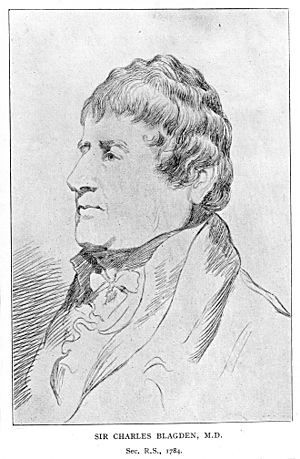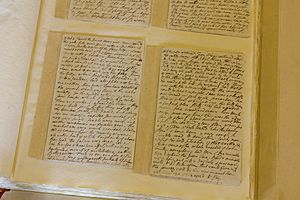Charles Blagden facts for kids
Quick facts for kids
Charles Brian Blagden
|
|
|---|---|

Blagden Charles (late 18th/early 19th century) by Mary Dawson Turner from a sketch by Thomas Phillips.
|
|
| Born | 17 April 1748 Wotton-under-Edge, Gloucestershire
|
| Died | March 26, 1820 (aged 71) Arcueil, France
|
| Nationality | British |
| Known for | Studies of perspiration and the freezing point of solutions |
| Awards | Copley Medal (1788) |
Sir Charles Brian Blagden (born April 17, 1748 – died March 26, 1820) was a very smart English doctor and chemist. He worked as a medical officer in the British Army from 1776 to 1780. Later, he became the Secretary of the Royal Society, which is a famous group for scientists.
Blagden received a major award called the Copley Medal in 1788. He was also made a knight in 1792, which means he was given the title "Sir." He passed away in Arcueil, France, in 1820 and was buried in Paris.
Amazing Science Discoveries
Charles Blagden was involved in some important scientific moments. In 1783, he visited Antoine Lavoisier, a famous French chemist, in Paris. Blagden shared how his colleague, Henry Cavendish, had made water by burning a gas called "inflammable air."
This discussion helped Lavoisier understand more about how chemicals combine. It led to Lavoisier's ideas about chemical reactions, which were a big step in starting modern chemistry. In 1789, Blagden was chosen as an honorary member of important science groups in America.
Surviving Extreme Heat
Blagden did interesting experiments to see how much heat the human body could handle. In 1775, he showed that people could stay in rooms as hot as 260 degrees Fahrenheit (127 degrees Celsius)!
He wrote a report to the Royal Society about his findings. In this report, he was the first Western scientist to officially explain how perspiration (sweating) helps our bodies stay cool. This process is called thermoregulation.
Blagden's Law of Freezing
Blagden also studied how adding things like salt to water changes its freezing point. He discovered something very important: the colder a solution gets before it freezes depends on how much stuff is dissolved in it.
He found that the freezing point of a solution goes down directly as you add more of the dissolved substance. This discovery is now known as Blagden's Law. It helps us understand why salt is used to melt ice on roads.


